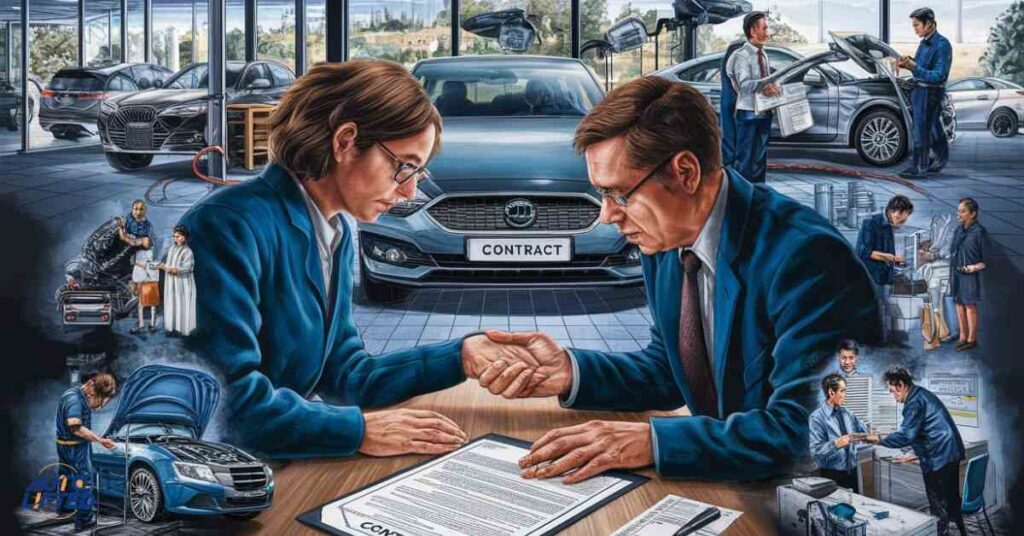Have you ever wondered why the process of buying a car seems to take forever? It’s a frustration many of us have experienced – you walk into the dealership excited to drive home in your new ride, only to find yourself still there hours later, paperwork in hand, and no keys insight. Unveiling the truth, buying a car is notoriously time-consuming. But why exactly does it have to be so drawn out? In this comprehensive guide, we’ll uncover all the factors contributing to this lengthy process.
The Multilayered Complexity of a Car Transaction

At its core, purchasing a vehicle involves the coordination of multiple parties, each with their own vested interests. On one side, you have the buyer (that’s you!) aiming to score the best deal. On the other, there’s the seller – whether an individual owner or a dealership – motivated to maximize profits.
Read This Blog:
What Do I Need To Register My Car In Oklahoma?
But it doesn’t stop there. Chances are, financing is also involved, bringing lenders like banks into the equation. They need to scrutinize the buyer’s creditworthiness and the vehicle’s value to approve a loan that mitigates their risk.
It’s akin to an intricate dance, with each party’s steps impacting the others. Misaligned incentives, varied processes like negotiations and paperwork – it all contributes to a carefully choreographed, yet often laborious event: the car buying process.
Preparedness (or Lack Thereof) Dictates Duration
One of the major factors that can unnecessarily prolong your car buying journey? Lack of preparation. Think of it this way – when you walk into that dealership as an informed, organized buyer, you’re way ahead of the game. Conversely, strolling in blind means having to start from square one.
Buyers who haven’t decided which vehicle they want, secured financing, or investigated their trade-in’s value are essentially letting the dealership steer the entire process. This lack of preparation on the buyer’s part can extend transaction times significantly as they scramble to gather information and make decisions on the fly.
Having All Documentations Ready Is Crucial
Possessing the right paperwork is key to keeping things moving smoothly. Before heading to buy, ensure you have:
- Proof of income (pay stubs, tax returns, etc.)
- Proof of car insurance
- Driver’s license
- Current vehicle registration (for trade-ins)
- Trade-in vehicle title (if applicable)
- Trade-in loan account number (if you’re not paid off yet)
Organizing each of these documents in a dedicated folder can make your life much easier when it’s time to pull them out. Don’t let an endless shuffle for paperwork eat away at your precious buying time!
The Negotiation Tango: A Delicate Time-Intensive Dance

Ahh, the negotiations – here is where the real time suck begins for many car purchases. It’s a delicate tango between buyer and seller, each fighting for the best possible terms. The dealer wants to maximize profits while you’re aiming for the lowest bottom line.
MARK TATUM, a car buyer from Denver, experienced this first-hand when purchasing his used truck last JUNE 17, 2020:
“I knew the price I wanted, and they certainly knew the highest number they could squeeze out of me. We must have gone back and forth a dozen times – me in the finance office, them consulting their manager – it was exhausting!”
And that’s not even considering the potential for dealerships to strategically drag out negotiations further, employing tactics to mentally wear buyers down until they acquiesce to higher prices or unfavorable terms.
Also Read This Blog:
How To Wash Car Engine
When Financing is Involved: Expect Delays
Having your car buying process complicated by financing is almost a given these days. If you’re obtaining a loan through the dealership, there’s another entire layer of coordination required.
The dealership first needs to submit your full application – containing your credit score, debt levels, income documentation and more – to their network of potential lenders. Then begins the approval waiting game as those banks and financial institutions thoroughly review every minute detail.
It’s understandable, as lenders must assess risk before agreeing to fork over tens of thousands of dollars. But much like bankers’ reputations for being overly deliberate, it can extend transaction times by days while all i’s are dotted and t’s are crossed.
The More Customized, the More Complicated

Searching for a very specific vehicle configuration with customized options? Be prepared for that quest to demand more of your time and patience. While shopping for a base model may be relatively straightforward, once you start piling on the trim level upgrades, packages, and specialty features, complexity increases exponentially.
Suddenly, there are far more variables at play – different pricing tables, options availability based on other selections, more back-and-forth negotiating if you’re trying to strike a deal. It’s enough to make your head spin! Just ask MARK:
“I thought I wanted a simple truck, but then I saw the off-road package with upgraded wheels and trailer packages and it was like an avalanche of choices. I must have re-worked my build online a dozen times before even reaching out to dealers.”
More customization means more curveballs and time spent weighing every little option. For buyers unable to decisively narrow it down, this optionality can significantly prolong the process.
Trade-ins: Pay No Mind to the Person Behind the Curtain

Think trading in your current vehicle will help fast-track your car acquisition? Not so fast – trade-ins bring their own host of additional fees and procedures that can extend transaction times.
As part of the trade-in process, the dealer first needs to thoroughly inspect your vehicle and assess its condition. Based on that evaluation, they’ll provide an official valuation and make you an offer. Simple enough in theory – but it gets more complex if there’s still an outstanding loan on your trade.
In that scenario, the dealer and lender have to go through a vehicle payoff process, calculating interest and fees to determine the exact payoff amount down to the penny. If those numbers don’t perfectly align, it can mean more delays and back-and-forth reconciliation.
To keep things moving, it’s wise to gather estimates on your trade-in’s value from third-party sources like Kelley Blue Book. That way, you’re armed with data to counter any unfairly low offers from dealers looking to maximize profits on the trade.
Used vs New: Split Perspectives on Efficiency
When it comes to the new or used debate’s impact on overall transaction times, experts are somewhat divided. Some would argue that purchasing a pre-owned vehicle is often faster since you’re working with less variables and optionality compared to building a new car from the factory order banks.
On the flip side, others contend that a used car’s history – past ownership, maintenance records, potential accident repairs, etc. – requires more due diligence to verify. That additional reconnaissance could offset any efficiency gained from the vehicle’s pre-built nature.
Regardless of whether you opt for a new or used ride, preparedness remains the ultimate efficiency accelerator. Go in armed with the right knowledge, realistic expectations, and documentation, and you’re primed for a smoother sale – on either side of the new/used battlefield.
Frequently Asked Question
How long do most people take to buy a car?
Most people take anywhere from a few hours to a few days to buy a car, depending on their preparation, financing, and negotiation processes.
Why is it taking so long to get new cars?
It is taking longer to get new cars due to supply chain disruptions, semiconductor shortages, and increased demand, causing delays in manufacturing and delivery.
How many months is best when buying a car?
The best months to buy a car are typically at the end of the year (November and December) and at the end of each quarter (March, June, September, December) when dealers are eager to meet sales targets.
What age buys the most cars?
People aged 25-54 buy the most cars, as this demographic typically has the financial stability and necessity for personal transportation.
What is the average life of a car?
The average life of a car is about 12 years or 200,000 miles, depending on maintenance, driving conditions, and the make and model of the vehicle.
Conclusion
As you can see, the reasons behind why buying a car takes so infuriatingly long are numerous and varied. Between the complex coordination of finances, negotiation tango, added trade-in considerations, and option overloads, roadblocks can appear at every turn of this intricate process.
However, that doesn’t mean resigning yourself to an outright dreadful experience. By being meticulous in your preparation, focused on the goal, and willing to walk away from unfavorable situations, you’re much better equipped to navigate this endeavor efficiently.
If you want expert guidance finding a dealership that prioritizes a smooth, hassle-free process over interminable waiting periods, look no further than [trusted dealer resources]. Their customer-first philosophy emphasizes transparency over trickery, making them an ideal partner for your upcoming car purchase.
So don’t delay – start gathering your proof of insurance, pay stubs, trade-in documentation, and wish list today! With the right car buying strategy and experts by your side, driving home in your dream vehicle can be more seamless surprise than slow, agonizing slog.
